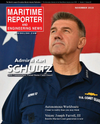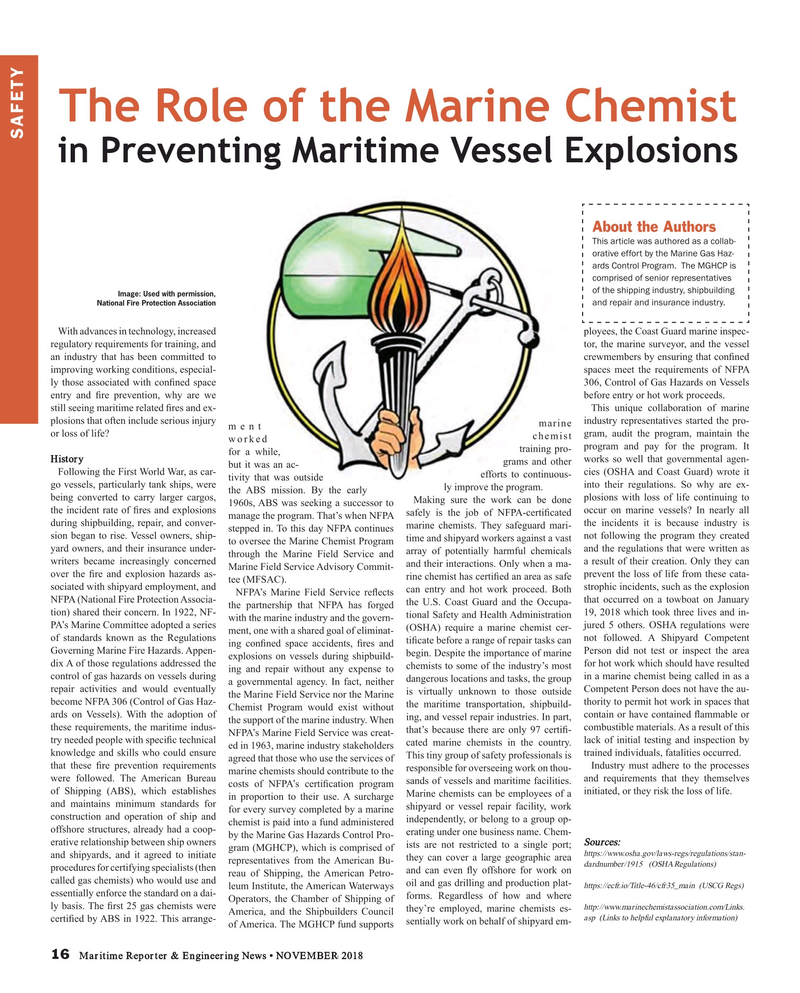
Page 16: of Maritime Reporter Magazine (November 2018)
Workboat Edition
Read this page in Pdf, Flash or Html5 edition of November 2018 Maritime Reporter Magazine
The Role of the Marine Chemist
SAFETY in Preventing Maritime Vessel Explosions
About the Authors
This article was authored as a collab- orative effort by the Marine Gas Haz- ards Control Program. The MGHCP is comprised of senior representatives of the shipping industry, shipbuilding
Image: Used with permission, and repair and insurance industry.
National Fire Protection Association
With advances in technology, increased ployees, the Coast Guard marine inspec- regulatory requirements for training, and tor, the marine surveyor, and the vessel an industry that has been committed to crewmembers by ensuring that con? ned improving working conditions, especial- spaces meet the requirements of NFPA ly those associated with con? ned space 306, Control of Gas Hazards on Vessels entry and ? re prevention, why are we before entry or hot work proceeds.
still seeing maritime related ? res and ex- This unique collaboration of marine plosions that often include serious injury marine industry representatives started the pro- ment or loss of life? chemist gram, audit the program, maintain the worked program and pay for the program. It training pro- for a while,
History grams and other works so well that governmental agen- but it was an ac-
Following the First World War, as car- cies (OSHA and Coast Guard) wrote it efforts to continuous- tivity that was outside go vessels, particularly tank ships, were into their regulations. So why are ex- ly improve the program.
the ABS mission. By the early being converted to carry larger cargos, 1960s, ABS was seeking a successor to
Making sure the work can be done plosions with loss of life continuing to the incident rate of ? res and explosions safely is the job of NFPA-certi? cated occur on marine vessels? In nearly all manage the program. That’s when NFPA during shipbuilding, repair, and conver- the incidents it is because industry is stepped in. To this day NFPA continues marine chemists. They safeguard mari- sion began to rise. Vessel owners, ship- to oversee the Marine Chemist Program time and shipyard workers against a vast not following the program they created yard owners, and their insurance under- through the Marine Field Service and array of potentially harmful chemicals and the regulations that were written as writers became increasingly concerned Marine Field Service Advisory Commit- a result of their creation. Only they can and their interactions. Only when a ma- over the ? re and explosion hazards as- rine chemist has certi? ed an area as safe prevent the loss of life from these cata- tee (MFSAC).
sociated with shipyard employment, and NFPA’s Marine Field Service re? ects can entry and hot work proceed. Both strophic incidents, such as the explosion
NFPA (National Fire Protection Associa- that occurred on a towboat on January the partnership that NFPA has forged the U.S. Coast Guard and the Occupa- tion) shared their concern. In 1922, NF- tional Safety and Health Administration 19, 2018 which took three lives and in- with the marine industry and the govern-
PA’s Marine Committee adopted a series jured 5 others. OSHA regulations were (OSHA) require a marine chemist cer- ment, one with a shared goal of eliminat- of standards known as the Regulations ing con? ned space accidents, ? res and ti? cate before a range of repair tasks can not followed. A Shipyard Competent
Governing Marine Fire Hazards. Appen- begin. Despite the importance of marine Person did not test or inspect the area explosions on vessels during shipbuild- dix A of those regulations addressed the ing and repair without any expense to chemists to some of the industry’s most for hot work which should have resulted control of gas hazards on vessels during repair activities and would eventually a governmental agency. In fact, neither dangerous locations and tasks, the group in a marine chemist being called in as a the Marine Field Service nor the Marine is virtually unknown to those outside Competent Person does not have the au- become NFPA 306 (Control of Gas Haz- thority to permit hot work in spaces that
Chemist Program would exist without the maritime transportation, shipbuild- ards on Vessels). With the adoption of the support of the marine industry. When ing, and vessel repair industries. In part, contain or have contained ? ammable or these requirements, the maritime indus- combustible materials. As a result of this that’s because there are only 97 certi? -
NFPA’s Marine Field Service was creat- try needed people with speci? c technical cated marine chemists in the country. lack of initial testing and inspection by ed in 1963, marine industry stakeholders knowledge and skills who could ensure trained individuals, fatalities occurred.
This tiny group of safety professionals is agreed that those who use the services of that these ? re prevention requirements marine chemists should contribute to the
Industry must adhere to the processes responsible for overseeing work on thou- were followed. The American Bureau costs of NFPA’s certi? cation program sands of vessels and maritime facilities. and requirements that they themselves of Shipping (ABS), which establishes in proportion to their use. A surcharge Marine chemists can be employees of a initiated, or they risk the loss of life. and maintains minimum standards for for every survey completed by a marine shipyard or vessel repair facility, work construction and operation of ship and chemist is paid into a fund administered independently, or belong to a group op- offshore structures, already had a coop- erating under one business name. Chem- by the Marine Gas Hazards Control Pro- erative relationship between ship owners gram (MGHCP), which is comprised of ists are not restricted to a single port; Sources: https://www.osha.gov/laws-regs/regulations/stan- and shipyards, and it agreed to initiate representatives from the American Bu- they can cover a large geographic area dardnumber/1915 (OSHA Regulations) procedures for certifying specialists (then and can even ? y offshore for work on reau of Shipping, the American Petro- called gas chemists) who would use and https://ecfr.io/Title-46/cfr35_main (USCG Regs) leum Institute, the American Waterways oil and gas drilling and production plat- essentially enforce the standard on a dai-
Operators, the Chamber of Shipping of forms. Regardless of how and where ly basis. The ? rst 25 gas chemists were http://www.marinechemistassociation.com/Links.
America, and the Shipbuilders Council they’re employed, marine chemists es- asp (Links to helpful explanatory information) certi? ed by ABS in 1922. This arrange- of America. The MGHCP fund supports sentially work on behalf of shipyard em- 16 Maritime Reporter & Engineering News • NOVEMBER 2018
MR #11 (10-17).indd 16 MR #11 (10-17).indd 16 10/30/2018 10:19:39 AM10/30/2018 10:19:39 AM

 15
15

 17
17
